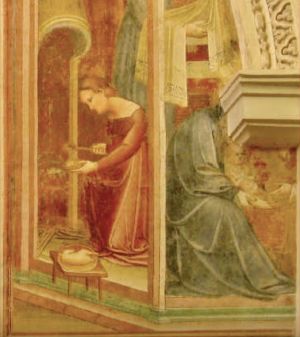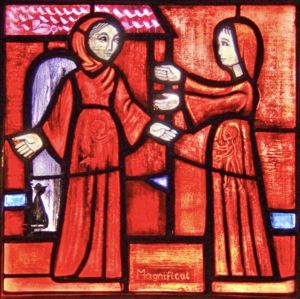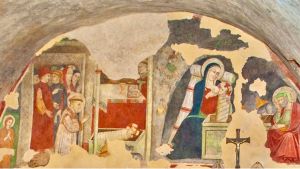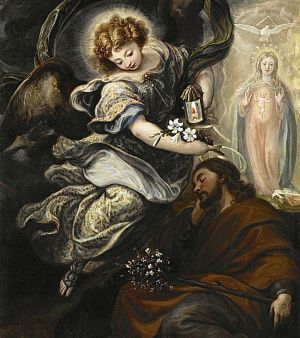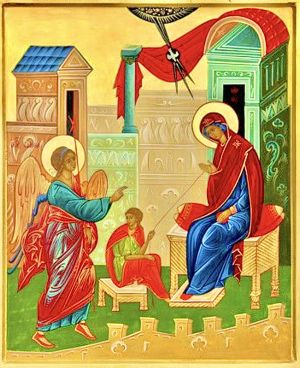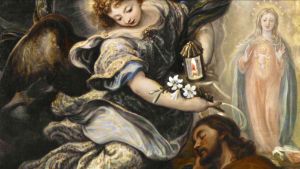
Teresa Girolami
Teresa Girolami è laureata in Materie letterarie e Teologia. Ha pubblicato vari testi, fra cui: "Pellegrinaggio del cuore" (Ed. Piemme); "I Fiammiferi di Maria - La Madre di Dio in prosa e poesia"; "Tenerezza Scalza - Natura di donna"; co-autrice di "Dialogo e Solstizio".
He chose him as the prophet of Light
«Blessed is the Lord, the God of Israel,/ for he has visited and redeemed his people» (Lk 1:68).
Francis, a gift from Heaven sent to prepare God's ways, after Providence led him to complete conversion, was transformed by the Spirit into a Prophet for his time and beyond.
In the Major Legend, St. Bonaventure offers us the original figure and experience of the Poor Man of Assisi.
Like John, born to point to the Lamb of God, so was the young merchant's son. Renewed by his new spiritual birth, he sang the Mystery of the Incarnation in the fibres of his own flesh.
In the Sources we read:
"The Grace of God, our Saviour, in these last times has appeared in his servant Francis, to all those who are truly humble and truly friends of holy poverty.
For while they venerate in him the superabundance of God's mercy, they are instructed by his example to radically deny ungodliness and worldly desires, to live in conformity with Christ and to yearn, with insatiable thirst and desire, for blessed hope.
On him, truly poor and contrite of heart, God rested his gaze with great condescension and goodness; not only did he lift him, a beggar, from the dust of worldly life, but he made him a champion, guide and herald of evangelical perfection and chose him as a light, for believers, so that, having become a witness to the light, he might prepare for the Lord the way of light and peace in the hearts of the faithful" (FF 1020).
"Like the morning star, appearing in the midst of the clouds, with the radiant rays of his life and teaching, he drew to the light those who lay in the shadow of death; like the rainbow shining through the bright clouds, bearing in himself the sign of the covenant with the Lord, he proclaimed to men the Gospel of peace and salvation.
Angel of true peace, he too, in imitation of the Precursor, was predestined by God to prepare the way in the desert of the highest poverty and to preach penance by example and word" (FF 1021).
«And you, child, will be called a prophet of the Most High/ because you will go before the Lord to prepare his ways» (Lk 1:76)
Feria proper of 24 December - Christmas Eve (Lk 1:67-79)
«What do you think he will become, this son of mine?»
Today's Gospel presents us with the birth of John, the prophet of Christ, and the amazement of onlookers:
«What shall this child be? And indeed the hand of the Lord was with him» (Lk 1:66).
In the life of Francis, from his birth, a visible sign of God's predilection was manifested on him and his mother Mona Pica.
The Sources make this clear:
"In fact, she was made to share, as a privilege, a certain resemblance to the ancient Saint Elizabeth, both by the name imposed on her son and also by the prophetic spirit.
When neighbours expressed their admiration for Francis' generosity of spirit and moral integrity, she would repeat almost divinely inspired:
«What do you think he will become, this son of mine? Know, that by his merits he will become a son of God».
In fact, this was also the opinion of others, who appreciated Francis already grown up for some of his very good inclinations.
He shunned anything that might sound offensive to anyone and, growing up with a gentle spirit, he did not appear to be a son of those who were called his parents.
Therefore the name of John is appropriate to the mission he then carried out, that of Francis to his fame, which soon spread everywhere after his full conversion to God.
Above the feast of any other saint, he held that of John the Baptist to be most solemn, whose distinguished name had imprinted in his soul a sign of arcane power.
Among those born of women there arose none greater than this, and none more perfect than this among the founders of religious orders. It is a coincidence worthy of note' (FF 583).
Feria proper of 23 December (Lk 1:57-66)
Mary: Life that becomes an unceasing Canticle, and a dance with the Eternal
Paraphrasing a passage from the Spiritual Testament of Clare of Assisi and looking at Mary magnifying the Lord, we could say:
"The Daughter of Zion made herself our way, and this by word and example our blessed father Francis, true lover and imitator of her, showed and taught us" (FF 2824).
For it is now clear that the Poverello saw in Mary the life that becomes an unceasing Canticle to Him who had chosen her in the redemptive mission to be fulfilled with her Son.
Francis recognises in her the Imprint of God, and like Mary he magnifies the Lord and exults in God his Saviour "because he has looked upon the humility of his servant".
Thus Francis, in his Canticle of the Creatures, restores to God the praise due Him for the benefits received from Him, recognising His nullity.
He also invites us to do the same in the "Exhortation to the Praise of God" (Praise of God in the place of the Hermit).
It is interesting to know that these praises were found as the antipendium of the altar in the chapel of St Francis in the place of the Hermit, in the small chapel.
These praises were noted by the companions of the Poverello himself and written on the said panel on the left wall, near the altar, and it is said that Francis wrote them here in his own hand:
"All you who fear the Lord, praise him./ Hail, Mary, full of grace, the Lord is with you..../ Let every living person give praise to the Lord.../ Praise the Lord because he is good/ Praise the Lord O creatures all.../ Blessed be the holy Trinity/ and the indivisible Unity..." (FF 265/a).
And in the famous Canticle, like Mary, she raises her Praise to the Creator and Lord and Saviour:
«Most High, all-powerful, good Lord,/
Yours are the praises, the glory, the honour and all blessing.
To You alone, Most High, they befit...» (FF 263)
«My soul magnifies the Lord/ and my spirit exults in God my Saviour,/ because he has looked upon the humility of his servant» (Lk 1:46-48)
Feria proper, 22 December (Lk 1:46-55)
Christmas of Francis and Clare
Prophecy and obedience
The birth of Jesus announced to Joseph in the Gospel of St Matthew highlights not only Isaiah's prophecy but also Joseph's obedience to God's plan.
As the operetta contained in the Sources tells us: «Sacrum Commercium», Francis, a just and God-fearing man, marries Lady Poverty, with a mutual exchange of gifts and promises, with a commitment of love and fidelity summed up in one word: «Covenant».
We read:
"So enamoured of your beauty, the Son of the Most High Father united himself closely to you alone in the world and knew you to be most faithful in all things.
Even before He came to earth from the splendour of His homeland, you prepared a worthy dwelling for Him, a throne on which to sit and a bedchamber where to rest, that is, the very poor Virgin, from whom He was born to shine upon this world.
You hastened to meet him as soon as he was born, so that he might find in you, and not in softness, a place that was pleasing to him.
He was laid, says the evangelist, in a manger, because there was no room for him in the inn.
In the same way, without ever separating yourself from him, you always accompanied him, so much so that throughout his life, when he appeared on earth and lived among men, while the foxes had their dens and the birds of the sky had their nests, he had nowhere to lay his head.
And later, when he, who had once opened the mouths of the prophets, opened his mouth to teach, he first wanted to praise you, he first exalted you with the words: blessed are the poor in spirit, for theirs is the Kingdom of Heaven" (FF 1977).
Chiara d'Assisi echoes this in one of her letters to her spiritual daughter, writing:
" If, therefore, such a great Lord, descending into the womb of the Virgin, wanted to appear in the world as a despicable, needy and poor man, so that men - who were very poor and destitute, hungry for the excessive scarcity of heavenly nourishment - might become rich in Him with the possession of the heavenly realms, rejoice and be very glad, filled with enormous joy and spiritual gladness (FF 2865).
Fourth Sunday in Advent (A) (Mt 1:18-24)
«Let no thought disturb you»
Today's Gospel turns its gaze on Mary of Nazareth and gives us the principal expression of the Annunciation:
«Fear not, Mary, for you have found grace with God» (Lk 1:30).
Francis made himself a jester of God, but as he loved her, we might add: 'jester of the Blessed Virgin'. He saw in the divine favour poured out by God upon Mary the gift par excellence of the Giver of all good.
Clare herself, in her Spiritual Testament, addressed to her daughters, says:
"By means of these virtues, and not by our own merits, but by the sole mercy and Grace of the Giver, the Father of mercies himself, may they always pour out the perfume of their good name on those who are far off, as on those who are near" (FF 2846).
Thus highlighting how the enemy of Grace is detraction, which Mary never knew.
Grace was the travelling companion of Francis and Clare of Assisi.
We find wonderful expressions in this regard in the second letter addressed by Clare to Agnes of Prague. In various passages, they well recall the beauty of Mary of Nazareth:
"I give thanks to the Author of grace, from whom, as we believe, comes every supreme good and every perfect gift, because he has adorned you with so many recognitions of virtue and has illustrated you with the insignia of such high perfection that, having made you a diligent imitator of the Father, in whom is all perfection, you deserve to become perfect in your turn, so that his eyes find in you no sign of imperfection" (FF 2872).
Clare, 'àltera Maria', unwillingly conveys to Agnes in these few lines what she lives by Grace, offering the testimony of the Marian perfume of a handmaiden wide open to the Gift.
And Francis, on the other hand, on his path of conversion had so well understood the beneficial effects of Grace, that he put into action the same gratuitousness he received towards his brothers, especially towards those who showed the greatest need.
The Sources, in fact, narrate of a friar who in his heart pondered whether he could consider himself worthy of the Grace of heaven to those whom the Saint treated with familiarity.
Whereupon Francis, enlightened by the Spirit, addressed this friar saying:
"Let no thought disturb you, O son, for I hold you the dearest of all those who are particularly dear to me, and I gladly make you a gift of my familiarity and love".
The friar was amazed and, having become even more devout since then, not only did he grow in love towards the Saint, but by the work and Grace of the Holy Spirit he was enriched with ever greater gifts (FF 1196).
Feria proper of December 20 (Lk 1:26-38)
Great before the Lord
The Lucan passage considered in this feria of Advent is the announcement of the angel Gabriel to the priest Zechariah who was officiating in the temple: despite the advanced age of both spouses, they were to have a son named John.
But his lack of faith rendered him mute until the day of the fulfilment of that event, which also redeemed his wife Elizabeth from the infamy of the time for her barrenness.
As a new John, Francis was given to the world to announce salvation, to bring glad tidings to all.
His mother, Mona Pica, of marked interiority and openness to the new, immediately sensed that her son would be great before the Lord.
In the Franciscan Sources, his birth is presented as a new beginning of Christlikeness, spread through the folds of life.
In them we read: "The servant and friend of the Most High, Francis, was given this name by divine Providence, so that by his originality and novelty the fame of his mission might spread more easily throughout the world. His mother had called him John, when he was reborn of water and the Holy Spirit, and from a son of wrath had become a son of grace*.
A mirror of righteousness, that woman presented in her conduct, as it were, a visible sign of his virtue. In fact, she was made to share, as a privilege, a certain resemblance to the ancient Saint Elizabeth, both by the name she bestowed on her son and also by her prophetic spirit.
When neighbours expressed their admiration for Francis' generosity of spirit and moral integrity, she would repeat, almost divinely inspired:
«What do you think he will become, this son of mine? Know that by his merits he will become a son of God».
[...] Therefore, the name of John is appropriate to the mission he then carried out, that of Francis to his fame, which soon spread everywhere after his full conversion to God.
Above the feast of any other saint, he held that of John the Baptist to be most solemn, whose distinguished name had imprinted in his soul a sign of arcane power.
Among those born of women there arose none greater than this, and none more perfect than this among the founders of religious orders" (FF 583).
Francis put all his enthusiasm into understanding and realising the suggestions of the new Grace: to announce the perfection of the Gospel, preaching penance to all, with simplicity.
And since for the Poverello the voice of the smallest had the same weight as the voice of the great, indeed it is privileged, in the Spirit, because of that priority given to the smallest by the Gospel, the Lord took him at his word for his making himself the least in everything and among everyone.
"Often the Lord manifests what is best to the least" (Reg. c. IV. 18).
«And many will rejoice at his birth, for he will be great before the Lord» (Lk 1:14b-15a)
* Francis was baptised in the church of Santa Maria del Vescovado. The baptistery was later moved to the cathedral of San Rufino, where it still stands today.
Feria proper on December 19 (Lk 1:5-25)
Annunciation to Joseph, and Francis welcomed Clare
«Covenant»
The birth of Jesus narrated in Matthew's Gospel highlights not only Isaiah's prophecy but also Joseph's obedience to God's plan.
«Joseph, son of David, do not be afraid to take Mary your wife with you [...]» (Mt 1:20).
As the little work in the Sources tells us: "Sacrum Commercium", Francis, a righteous and fearful man, married Our Lady Poverty, with a mutual exchange of gifts and promises, with a commitment of love and fidelity summed up by one word: "Covenant".
We read:
"Thus enamoured of your beauty, the Son of the Most High Father to you alone was closely united in the world and knew you for proof most faithful in all things.
Even before He came to earth from the splendour of His homeland, Thou didst prepare for Him a worthy habitation, a throne on which to sit, and a throne in which to rest, namely, the most poor Virgin, from whom He was born to shine upon this world.
To him as soon as he was born with solicitude you ran to meet him, so that he might find in you, and not in softness, a place that would be pleasing to him.
He was laid, says the evangelist, in a manger, because there was no room for him in the inn.
In the same way, never parting from him, you always accompanied him, so that throughout his life, when he appeared on earth and lived among men, while the foxes had their dens and the birds of heaven their nests, he had nowhere to lay his head.
And later when he, who had once opened the mouth of the prophets, opened his mouth to teach, he first wanted to praise you, he first exalted you with the words: blessed are the poor in spirit, for theirs is the kingdom of heaven" (FF 1977).
This is echoed by Clare of Assisi, who in one of her letters to her spiritual daughter, writes:
"If, therefore, such and so great a Lord, coming down in the Virgin's womb, wanted to appear in the world as a despicable, needy and poor man, so that men - who were very poor and destitute, hungry because of the excessive scarcity of heavenly nourishment - might become rich in Him by possessing the heavenly realms, exult and enjoy greatly, filled with enormous joy and spiritual gladness" (FF 2865).
Weekday Liturgy, 18 December (Mt 1:18-24)
Son of a genealogy without beginning or end
In its universal dimension, Francis never even mentally created categories of people who were deserving or not deserving of salvation - for which Christ gave Himself on behalf of all.
Even unworthy names appear in the genealogy of Jesus, from a human point of view, attesting to the intermingling of Christ with our history, who came to redeem the 'deserving' and the undeserving, to become One with us, except for sin.
Francis, who thought it worthy to leave the habit who stripped his brother of his good name, actually strips himself of everything, of his own noble origin (the son of a rich merchant without too many scruples, and of Madonna Pica, a Frenchwoman from beyond the Alps, with a noble heart).
He reinserts himself into common history, breaking out of the enclosures in which people wanted to enclose him, and calling 'Father' He who is in heaven.
He makes all human history his own, and puts himself back, in poverty, in the following of Christ.
Francis departing from the social and commercial greed of his natural father, helped by the rectitude of his mother, Monna Pica, becomes an instrument of God,
He is the son of a genealogy without beginning or end, no longer limited to those social strata animated by profit, to which the carnal bond wanted to bind him.
And in his spiritual family tree we will find people of all ranks who, converted to Christ, will make Francis' descendants more numerous than the stars or the sands of the sea.
From his mother he had inherited a tender and far-sighted heart, sensitive to the divine.
"A mirror of righteousness, that woman presented in her conduct, so to speak, a visible sign of her virtue [...].
She bore, as a privilege, a certain resemblance to the ancient Elizabeth, both in the name she bestowed on her son and also in her prophetic spirit.
When neighbours expressed their admiration for Francis' generosity of spirit and moral integrity, she would repeat, almost divinely inspired:
«What do you think he will become, this son of mine? Know, that by his merits he will become a son of God» (FF 583).
And the Sources continue:
"Therefore the name of John is appropriate to the mission he carried out, that of Francis to his fame [...].
Among those born of women there arose none greater than this, and none more perfect than this among the founders of religious orders" (FF 583).
Weekday Liturgy, 17 December (Mt 1,1-17)
Familiarity at the human level makes it difficult to go beyond this in order to be open to the divine dimension. That this son of a carpenter was the Son of God was hard for them to believe. Jesus actually takes as an example the experience of the prophets of Israel, who in their own homeland were an object of contempt, and identifies himself with them (Pope Benedict)
La familiarità sul piano umano rende difficile andare al di là e aprirsi alla dimensione divina. Che questo Figlio di un falegname sia Figlio di Dio è difficile crederlo per loro. Gesù stesso porta come esempio l’esperienza dei profeti d’Israele, che proprio nella loro patria erano stati oggetto di disprezzo, e si identifica con essi (Papa Benedetto)
These two episodes — a healing and a resurrection — share one core: faith. The message is clear, and it can be summed up in one question: do we believe that Jesus can heal us and can raise us from the dead? The entire Gospel is written in the light of this faith: Jesus is risen, He has conquered death, and by his victory we too will rise again. This faith, which for the first Christians was sure, can tarnish and become uncertain… (Pope Francis)
These two episodes — a healing and a resurrection — share one core: faith. The message is clear, and it can be summed up in one question: do we believe that Jesus can heal us and can raise us from the dead? The entire Gospel is written in the light of this faith: Jesus is risen, He has conquered death, and by his victory we too will rise again. This faith, which for the first Christians was sure, can tarnish and become uncertain… (Pope Francis)
The ability to be amazed at things around us promotes religious experience and makes the encounter with the Lord more fruitful. On the contrary, the inability to marvel makes us indifferent and widens the gap between the journey of faith and daily life (Pope Francis)
La capacità di stupirsi delle cose che ci circondano favorisce l’esperienza religiosa e rende fecondo l’incontro con il Signore. Al contrario, l’incapacità di stupirci rende indifferenti e allarga le distanze tra il cammino di fede e la vita di ogni giorno (Papa Francesco)
An ancient hermit says: “The Beatitudes are gifts of God and we must say a great ‘thank you’ to him for them and for the rewards that derive from them, namely the Kingdom of God in the century to come and consolation here; the fullness of every good and mercy on God’s part … once we have become images of Christ on earth” (Peter of Damascus) [Pope Benedict]
Afferma un antico eremita: «Le Beatitudini sono doni di Dio, e dobbiamo rendergli grandi grazie per esse e per le ricompense che ne derivano, cioè il Regno dei Cieli nel secolo futuro, la consolazione qui, la pienezza di ogni bene e misericordia da parte di Dio … una volta che si sia divenuti immagine del Cristo sulla terra» (Pietro di Damasco) [Papa Benedetto]
And quite often we too, beaten by the trials of life, have cried out to the Lord: “Why do you remain silent and do nothing for me?”. Especially when it seems we are sinking, because love or the project in which we had laid great hopes disappears (Pope Francis)
E tante volte anche noi, assaliti dalle prove della vita, abbiamo gridato al Signore: “Perché resti in silenzio e non fai nulla per me?”. Soprattutto quando ci sembra di affondare, perché l’amore o il progetto nel quale avevamo riposto grandi speranze svanisce (Papa Francesco)
The Kingdom of God grows here on earth, in the history of humanity, by virtue of an initial sowing, that is, of a foundation, which comes from God, and of a mysterious work of God himself (John Paul II)
duevie.art
don Giuseppe Nespeca
Tel. 333-1329741
Disclaimer
Questo blog non rappresenta una testata giornalistica in quanto viene aggiornato senza alcuna periodicità. Non può pertanto considerarsi un prodotto editoriale ai sensi della legge N°62 del 07/03/2001.
Le immagini sono tratte da internet, ma se il loro uso violasse diritti d'autore, lo si comunichi all'autore del blog che provvederà alla loro pronta rimozione.
L'autore dichiara di non essere responsabile dei commenti lasciati nei post. Eventuali commenti dei lettori, lesivi dell'immagine o dell'onorabilità di persone terze, il cui contenuto fosse ritenuto non idoneo alla pubblicazione verranno insindacabilmente rimossi.



